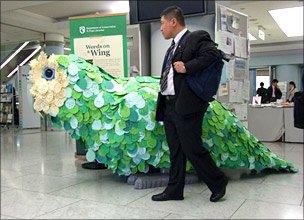World Bank to lead economic push on nature protection
- Published

The World Bank has launched a global partnership aimed at helping countries include the costs of destroying nature into their national accounts.
Ten nations will take part in the pilot phase, including India and Colombia.
The bank's president Robert Zoellick said environmental destruction happens partly because governments do not account for the value of nature.
The partnership was launched, external at the UN Convention on Biological Diversity (CBD) meeting in Nagoya, Japan.
"We know that human well-being depends on ecosystems and biodiversity," said Mr Zoellick.
"We also know they're degrading at an alarming rate.
"One of the causes is our failure to properly value ecosystems and all they do for us - and the solution therefore lies in taking full account of our ecosystem services when countries make policies."
Norway's Environment Minister Erik Solheim said re-valuing nature in this way would force business practices to change.
"We need to move from a situation where the benefits of ecosystem services are privatised whereas the costs are socialised," he said.
"The full costs of negative impacts on ecosystems must be covered by those who receive a benefit from destroying it."
Trillion-dollar question
The new project aims to pick up conclusions of a recent UN-backed project on The Economics of Ecosystems and Biodiversity (Teeb), and help governments turn them into policy.
Teeb's headline conclusion was that degradation of the natural world is costing the global economy $2-5 trillion (£1.3-3.2bn) per year.
In the report, it also commented, external that the natural world's economic value, in terms of its provision of clean water, good-quality soil, pollination and other services, was largely neglected by policymakers because it was "invisible".
"The groundbreaking report... has helped define the importance of biodiversity in a new way," said UK Environment Secretary Caroline Spelman.
"What's absolutely clear is that we need to bring about a real change in the way we value natural capital and ecosystem services and integrate them into the mainstream of our decision-making processes."
Ms Spelman and Mr Solheim both indicated their governments would support the new project's rollout.
Growing threat
In response to questions about whether businesses would resist this kind of natural capital accounting because it could affect their bottom lines, Ms Spelman suggested they would not object once they understood the reasoning behind it.
"Bees, for example, are worth about £440m to the UK economy," she said.
"When you think of having to substitute what nature provides for free, I think there won't be a backlash once people understand what ecosystem services provide."
Achim Steiner, executive director of the United Nations Environment Programme (Unep), added that a recent analysis showed that companies viewed biodiversity loss as a bigger threat than international terrorism.
Biodiversity glossary
The finding came originally from a World Economic Forum report, , which indicated businesses saw about an 8% likelihood that biodiversity loss would affect them - largely by damaging their reputation - while about 4% saw international terrorism as a threat.
"Some businesses are 'free riders' and take advantage of lax legislation to do things they won't be able to do in future," said Mr Steiner.
"But a lot of businesses are looking for ways to minimise their risk."
The draft agreement ministers are considering in the main negotiations here calls for "the values of biodiversity" to be integrated into countries' development and poverty reduction strategies.
But delegates are still arguing over whether to call for integration into national accounts.